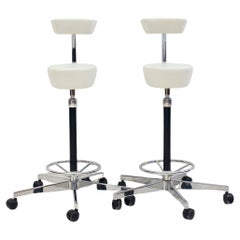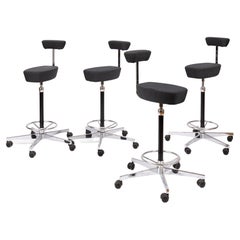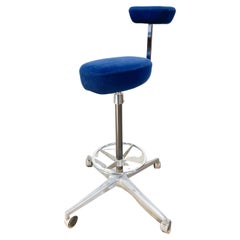Nelson Perch Stool
21st Century and Contemporary European Mid-Century Modern Stools
Chrome
Recent Sales
Early 2000s Italian Mid-Century Modern Stools
Stainless Steel
Mid-20th Century American Mid-Century Modern Stools
Aluminum
Vintage 1980s American Mid-Century Modern Stools
Aluminum
Vintage 1960s American Stools
Steel
Vintage 1980s American Mid-Century Modern Stools
Aluminum
Late 20th Century American Mid-Century Modern Stools
Aluminum, Steel
Vintage 1960s American Mid-Century Modern Stools
Aluminum, Steel
Vintage 1960s American Modern Office Chairs and Desk Chairs
Steel, Aluminum
Mid-20th Century American Mid-Century Modern Stools
Steel
Mid-20th Century American Mid-Century Modern Office Chairs and Desk Chairs
Chrome, Aluminum
George Nelson for sale on 1stDibs
Architect, designer, and writer George Nelson was a central figure in the mid-century American modernist design movement; and his thoughts influenced not only the furniture we live with, but also how we live.
Nelson came to design via journalism and literature. Upon receiving his bachelor’s degree in architecture from Yale in 1931, he won the Prix de Rome fellowship, and spent his time in Europe writing magazine articles that helped bring stateside recognition to Ludwig Mies van der Rohe, Gio Ponti, Le Corbusier and other canonical modernist architects.
In the 1940s, Nelson wrote texts that suggested such now-commonplace ideas as open-plan houses, storage walls and family rooms. D.J. De Pree, the owner of the furniture maker Herman Miller, was so impressed by Nelson that in 1944 — following the sudden death of Gilbert Rohde, who had introduced the firm to modern design in the 1930s — he invited Nelson to join the company as its design director. There Nelson’s curatorial design talents came to the fore.
To Herman Miller he brought such eminent creators as Charles and Ray Eames, Isamu Noguchi, and the textile and furniture designer Alexander Girard. Thanks to a clever contract, at the same time as he directed Herman Miller he formed a New York design company, George Nelson & Associates, that sold furniture designs to the Michigan firm. Nelson's studio also sold designs for clocks to the Howard Miller Clock Company, a manufacturer that was initially part of Herman Miller before it became an offshoot that was helmed by Howard Miller, D.J. De Pree's brother-in-law.
Nelson’s New York team of designers (who were rarely individually credited) would create such iconic pieces as the Marshmallow sofa, the Coconut chair, the Ball clock, the Bubble lamp series and the many cabinets and beds that comprise the sleek Thin-Edge line.
For dedicated collectors, as well as for interior designers who look beyond “the look,” there is a “cool factor” inherent to vintage pieces from George Nelson and others. Nelson was in on it from the start, and it’s valuable to have a piece that was there with him.
But still, as is evident from the offerings from dealers on 1stDibs, in any of the designs, in any iteration whose manufacture Nelson oversaw and encouraged, there are shining elements of lightness, elegance, sophistication — and a little bit of swagger. George Nelson felt confident in his ideas about design and didn’t mind letting the world know.
A Close Look at Mid-century Modern Furniture
Organically shaped, clean-lined and elegantly simple are three terms that well describe vintage mid-century modern furniture. The style, which emerged primarily in the years following World War II, is characterized by pieces that were conceived and made in an energetic, optimistic spirit by creators who believed that good design was an essential part of good living.
ORIGINS OF MID-CENTURY MODERN FURNITURE DESIGN
- Emerged during the mid-20th century
- Informed by European modernism, Bauhaus, International style, Scandinavian modernism and Frank Lloyd Wright’s architecture
- A heyday of innovation in postwar America
- Experimentation with new ideas, new materials and new forms flourished in Scandinavia, Italy, the former Czechoslovakia and elsewhere in Europe
CHARACTERISTICS OF MID-CENTURY MODERN FURNITURE DESIGN
- Simplicity, organic forms, clean lines
- A blend of neutral and bold Pop art colors
- Use of natural and man-made materials — alluring woods such as teak, rosewood and oak; steel, fiberglass and molded plywood
- Light-filled spaces with colorful upholstery
- Glass walls and an emphasis on the outdoors
- Promotion of functionality
MID-CENTURY MODERN FURNITURE DESIGNERS TO KNOW
- Charles and Ray Eames
- Eero Saarinen
- Milo Baughman
- Florence Knoll
- Harry Bertoia
- Isamu Noguchi
- George Nelson
- Danish modernists Hans Wegner and Arne Jacobsen, whose emphasis on natural materials and craftsmanship influenced American designers and vice versa
ICONIC MID-CENTURY MODERN FURNITURE DESIGNS
- Eames lounge chair
- Nelson daybed
- Florence Knoll sofa
- Egg chair
- Womb chair
- Noguchi coffee table
- Barcelona chair
VINTAGE MID-CENTURY MODERN FURNITURE ON 1STDIBS
The mid-century modern era saw leagues of postwar American architects and designers animated by new ideas and new technology. The lean, functionalist International-style architecture of Le Corbusier and Bauhaus eminences Ludwig Mies van der Rohe and Walter Gropius had been promoted in the United States during the 1930s by Philip Johnson and others. New building techniques, such as “post-and-beam” construction, allowed the International-style schemes to be realized on a small scale in open-plan houses with long walls of glass.
Materials developed for wartime use became available for domestic goods and were incorporated into mid-century modern furniture designs. Charles and Ray Eames and Eero Saarinen, who had experimented extensively with molded plywood, eagerly embraced fiberglass for pieces such as the La Chaise and the Womb chair, respectively.
Architect, writer and designer George Nelson created with his team shades for the Bubble lamp using a new translucent polymer skin and, as design director at Herman Miller, recruited the Eameses, Alexander Girard and others for projects at the legendary Michigan furniture manufacturer.
Harry Bertoia and Isamu Noguchi devised chairs and tables built of wire mesh and wire struts. Materials were repurposed too: The Danish-born designer Jens Risom created a line of chairs using surplus parachute straps for webbed seats and backrests.
The Risom lounge chair was among the first pieces of furniture commissioned and produced by celebrated manufacturer Knoll, a chief influencer in the rise of modern design in the United States, thanks to the work of Florence Knoll, the pioneering architect and designer who made the firm a leader in its field. The seating that Knoll created for office spaces — as well as pieces designed by Florence initially for commercial clients — soon became desirable for the home.
As the demand for casual, uncluttered furnishings grew, more mid-century furniture designers caught the spirit.
Classically oriented creators such as Edward Wormley, house designer for Dunbar Inc., offered such pieces as the sinuous Listen to Me chaise; the British expatriate T.H. Robsjohn-Gibbings switched gears, creating items such as the tiered, biomorphic Mesa table. There were Young Turks such as Paul McCobb, who designed holistic groups of sleek, blond wood furniture, and Milo Baughman, who espoused a West Coast aesthetic in minimalist teak dining tables and lushly upholstered chairs and sofas with angular steel frames.
Generations turn over, and mid-century modern remains arguably the most popular style going. As the collection of vintage mid-century modern chairs, dressers, coffee tables and other furniture for the living room, dining room, bedroom and elsewhere on 1stDibs demonstrates, this period saw one of the most delightful and dramatic flowerings of creativity in design history.
Finding the Right Stools for You
Stools are versatile and a necessary addition to any living room, kitchen area or elsewhere in your home. A sofa or reliable lounge chair might nab all the credit, comfort-wise, but don’t discount the roles that good antique, new and vintage stools can play.
“Stools are jewels and statements in a space, and they can also be investment pieces,” says New York City designer Amy Lau, who adds that these seats provide an excellent choice for setting an interior’s general tone.
Stools, which are among the oldest forms of wooden furnishings, may also serve as decorative pieces, even if we’re talking about a stool that is far less sculptural than the gracefully curving molded plywood shells that make up Sōri Yanagi’s provocative Butterfly stool.
Fawn Galli, a New York interior designer, uses her stools in the same way you would use a throw pillow. “I normally buy several styles and move them around the home where needed,” she says.
Stools are smaller pieces of seating as compared to armchairs or dining chairs and can add depth as well as functionality to a space that you’ve set aside for entertaining. For a splash of color, consider the Stool 60, a pioneering work of bentwood by Finnish architect and furniture maker Alvar Aalto. It’s manufactured by Artek and comes in a variety of colored seats and finishes.
Barstools that date back to the 1970s are now more ubiquitous in kitchens. Vintage barstools have seen renewed interest, be they a meld of chrome and leather or transparent plastic, such as the Lucite and stainless-steel counter stool variety from Indiana-born furniture designer Charles Hollis Jones, who is renowned for his acrylic works. A cluster of barstools — perhaps a set of four brushed-aluminum counter stools by Emeco or Tubby Tube stools by Faye Toogood — can encourage merriment in the kitchen. If you’ve got the room for family and friends to congregate and enjoy cocktails where the cooking is done, consider matching your stools with a tall table.
Whether you need counter stools, drafting stools or another kind, explore an extensive range of antique, new and vintage stools on 1stDibs.


